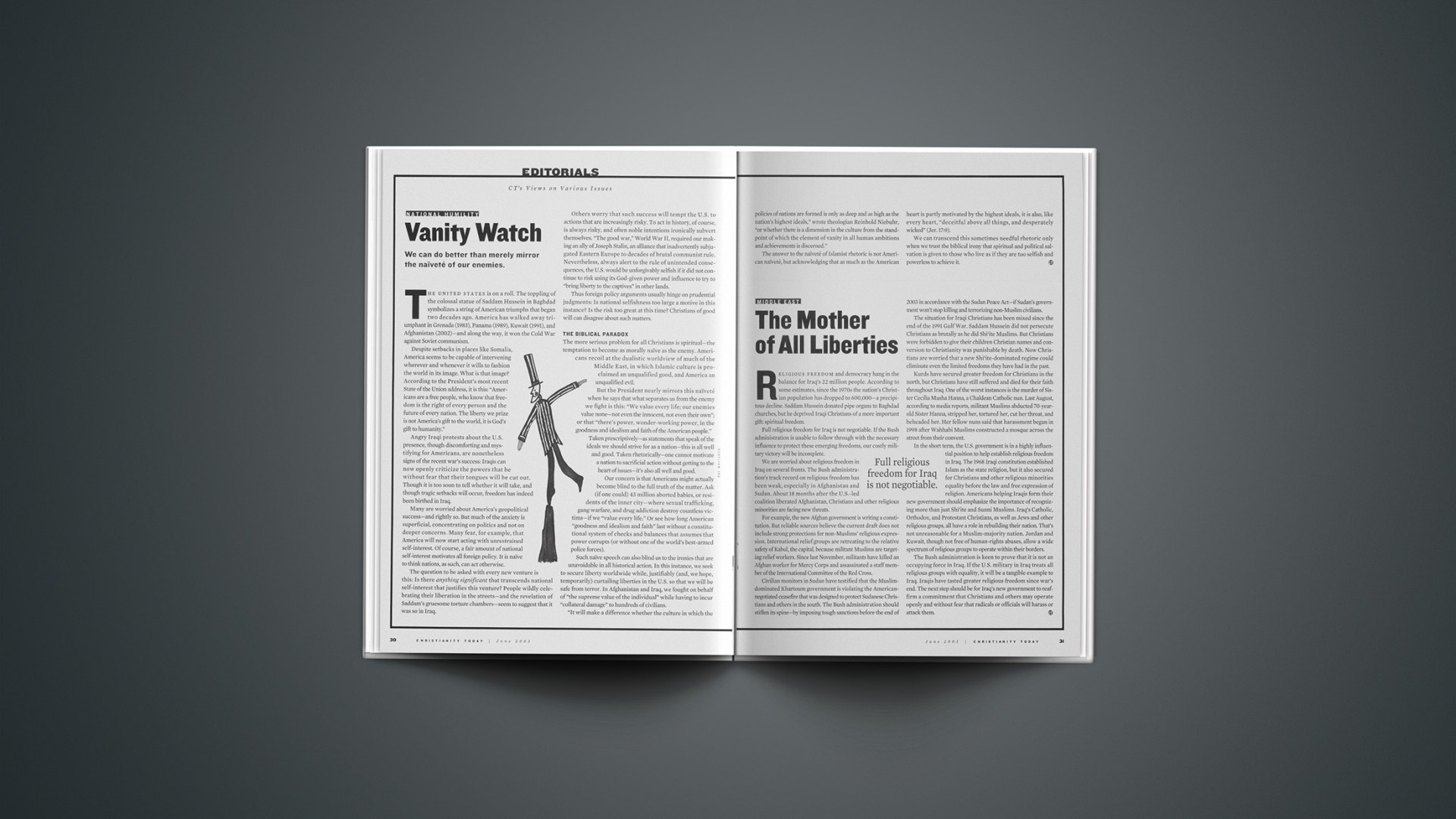The United States is on a roll. The toppling of the colossal statue of Saddam Hussein in Baghdad symbolizes a string of American triumphs that began two decades ago. America has walked away triumphant in Grenada (1983), Panama (1989), Kuwait (1991), and Afghanistan (2002)—and along the way, it won the Cold War against Soviet communism.
Despite setbacks in places like Somalia, America seems to be capable of intervening wherever and whenever it wills to fashion the world in its image. What is that image? According to the President’s most recent State of the Union address, it is this: “Americans are a free people, who know that freedom is the right of every person and the future of every nation. The liberty we prize is not America’s gift to the world, it is God’s gift to humanity.”
Angry Iraqi protests about the U.S. presence, though discomforting and mystifying for Americans, are nonetheless signs of the recent war’s success: Iraqis can now openly criticize the powers that be without fear that their tongues will be cut out. Though it is too soon to tell whether it will take, and though tragic setbacks will occur, freedom has indeed been birthed in Iraq.
Many are worried about America’s geopolitical success—and rightly so. But much of the anxiety is superficial, concentrating on politics and not on deeper concerns. Many fear, for example, that America will now start acting with unrestrained self-interest. Of course, a fair amount of national self-interest motivates all foreign policy. It is naïve to think nations, as such, can act otherwise.
The question to be asked with every new venture is this: Is there anything significant that transcends national self-interest that justifies this venture? People wildly celebrating their liberation in the streets—and the revelation of Saddam’s gruesome torture chambers—seem to suggest that it was so in Iraq.
Others worry that such success will tempt the U.S. to actions that are increasingly risky. To act in history, of course, is always risky, and often noble intentions ironically subvert themselves. “The good war,” World War II, required our making an ally of Joseph Stalin, an alliance that inadvertently subjugated Eastern Europe to decades of brutal communist rule. Nevertheless, always alert to the rule of unintended consequences, the U.S. would be unforgivably selfish if it did not continue to risk using its God-given power and influence to try to “bring liberty to the captives” in other lands.
Thus foreign policy arguments usually hinge on prudential judgments: Is national selfishness too large a motive in this instance? Is the risk too great at this time? Christians of good will can disagree about such matters.
The Biblical Paradox
The more serious problem for all Christians is spiritual—the temptation to become as morally naïve as the enemy. Americans recoil at the dualistic worldview of much of the Middle East, in which Islamic culture is proclaimed an unqualified good, and America an unqualified evil.
But the President nearly mirrors this naïveté when he says that what separates us from the enemy we fight is this: “We value every life; our enemies value none—not even the innocent, not even their own”; or that “there’s power, wonder-working power, in the goodness and idealism and faith of the American people.”
Taken prescriptively—as statements that speak of the ideals we should strive for as a nation—this is all well and good. Taken rhetorically—one cannot motivate a nation to sacrificial action without getting to the heart of issues—it’s also all well and good.
Our concern is that Americans might actually become blind to the full truth of the matter. Ask (if one could) 43 million aborted babies, or residents of the inner city—where sexual trafficking, gang warfare, and drug addiction destroy countless victims—if we “value every life.” Or see how long American “goodness and idealism and faith” last without a constitutional system of checks and balances that assumes that power corrupts (or without one of the world’s best-armed police forces).
Such naïve speech can also blind us to the ironies that are unavoidable in all historical action. In this instance, we seek to secure liberty worldwide while, justifiably (and, we hope, temporarily) curtailing liberties in the U.S. so that we will be safe from terror. In Afghanistan and Iraq, we fought on behalf of “the supreme value of the individual” while having to incur “collateral damage” to hundreds of civilians.
“It will make a difference whether the culture in which the policies of nations are formed is only as deep and as high as the nation’s highest ideals,” wrote theologian Reinhold Niebuhr, “or whether there is a dimension in the culture from the standpoint of which the element of vanity in all human ambitions and achievements is discerned.”
The answer to the naïveté of Islamist rhetoric is not American naïveté, but acknowledging that as much as the American heart is partly motivated by the highest ideals, it is also, like every heart, “deceitful above all things, and desperately wicked” (Jer. 17:9).
We can transcend this sometimes needful rhetoric only when we trust the biblical irony that spiritual and political salvation is given to those who live as if they are too selfish and powerless to achieve it.
Copyright © 2003 Christianity Today. Click for reprint information.
Related Elsewhere
More political comment and coverage is available in our CTPolitics and Law archive.
For more coverage on the Iraq conflict, commentary and thought on just war, or Christian debate, see our CTWar in Iraq archive.
Also appearing on our site today:
Reflections: Walk Humbly | Quotations to stir the heart and mind.










